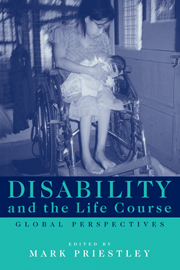Book contents
- Frontmatter
- Contents
- List of figures
- List of tables
- Notes on contributors
- Preface
- Acknowledgements
- A brief note on terminology
- I Concepts
- II Methods and stories
- III The politics of transition
- 13 Disabled children: an emergency submerged
- 14 Failing to make the transition? Theorising the ‘transition to adulthood’ for young disabled people
- 15 Breaking my head in the prime of my life: acquired disability in young adulthood
- 16 Work and adulthood: economic survival in the majority world
- 17 The possibility of choice: women with intellectual disabilities talk about having children
- 18 Ageing with disability in Japan
- 19 Ageing with intellectual disabilities; discovering disability with old age: same or different?
- 20 Epilogue
- Index
17 - The possibility of choice: women with intellectual disabilities talk about having children
Published online by Cambridge University Press: 30 September 2009
- Frontmatter
- Contents
- List of figures
- List of tables
- Notes on contributors
- Preface
- Acknowledgements
- A brief note on terminology
- I Concepts
- II Methods and stories
- III The politics of transition
- 13 Disabled children: an emergency submerged
- 14 Failing to make the transition? Theorising the ‘transition to adulthood’ for young disabled people
- 15 Breaking my head in the prime of my life: acquired disability in young adulthood
- 16 Work and adulthood: economic survival in the majority world
- 17 The possibility of choice: women with intellectual disabilities talk about having children
- 18 Ageing with disability in Japan
- 19 Ageing with intellectual disabilities; discovering disability with old age: same or different?
- 20 Epilogue
- Index
Summary
Until very recently, the choice to be or not to be a mother was essentially unavailable to most women, even today, the possibility of choice remains everywhere in jeopardy. This elemental loss of control over her body affects every woman's right to shape the imagery and insights of her own being.
(Rich 1979a: 196)As feminist researchers who have been working with women with intellectual disabilities, we found Adrienne Rich's quotation to be particularly poignant and ironic in relation to our recent work. Rich argues that a dominant traditional discourse in our societies has positioned women unquestioningly as mothers. Indeed she argues that ‘a woman's status as child bearer has been the test of her womanhood’ (Rich 1979b: 261). Women with disabilities have in the past been excluded from this societal expectation and their womanhood has been a problematic issue for those around them (Asch and Fine 1992; Johnson 1998a). This has been particularly the case for women with intellectual disabilities who were constituted by the eugenics movement early this century as a threat to the very structure of society because of their child bearing capacity (Brantlinger 1995; Rose 1979; Scheerenberger 1983).
Consequently, many women with intellectual disabilities were subject to sterilisation, constant surveillance and institutionalisation (Johnson 1998a; Potts and Fido 1991; Trent 1994) to prevent them from becoming mothers. For women with intellectual disabilities, then, the dominant discourse historically has situated them as women who are unfit to have children or to be mothers.
- Type
- Chapter
- Information
- Disability and the Life CourseGlobal Perspectives, pp. 206 - 218Publisher: Cambridge University PressPrint publication year: 2001
- 2
- Cited by



